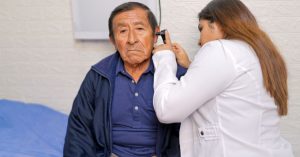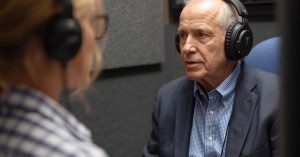Most people have experienced that satisfying “pop” in their ears when changing altitude on an airplane or driving through mountains. It’s a normal process that helps equalize pressure in your ears. But what happens when your ears pop constantly—even when you’re not changing elevation or feeling sick?
Frequent or persistent ear popping can feel distracting, uncomfortable, and even worrisome. It might seem like your ears are always adjusting to something, or that there’s a constant shift in pressure you’re trying to relieve. For some, it’s accompanied by a sense of fullness, muffled hearing, or even mild pain.
While occasional ear popping is completely natural, constant popping can be a sign that something’s off with how your ears manage pressure. In many cases, it’s linked to issues with the eustachian tubes—the small passages that connect your middle ear to the back of your throat. When these tubes don’t function properly, it can lead to a range of symptoms, from annoying to potentially serious.
In this article, we’ll explore what causes persistent ear popping, what it might mean for your health, and how you can treat—and even prevent—it. Whether you’re experiencing this for the first time or have been dealing with it for years, understanding what’s happening inside your ears is the first step toward finding relief.
What Causes Ear Popping? The Role of the Eustachian Tubes
To understand why your ears pop—especially when it happens frequently—it helps to know a bit about the eustachian tubes. These small canals run from the middle ear to the back of the nose and throat. Their job is to equalize air pressure on both sides of the eardrum and to allow any fluid in the middle ear to drain.
Under normal circumstances, the eustachian tubes open and close briefly when you swallow, yawn, or chew—actions that help equalize pressure. This is what causes the familiar popping sensation during altitude changes, like during a flight or while driving through hills.
But sometimes, the eustachian tubes don’t function properly. They may become partially blocked, inflamed, or overly sensitive, which can cause them to open and close more frequently—or not at all. This leads to the sensation of constant popping, a feeling of pressure, or ears that seem to “click” without a clear reason.
Some triggers that cause the eustachian tubes to malfunction include:
- Sudden changes in altitude (like elevators, tunnels, or driving over hills)
- Swallowing frequently (especially if you’re nervous or have dry mouth)
- Mild inflammation from allergies or mild sinus congestion
- Excessive yawning or jaw movement from stress or tension
Even subtle shifts in pressure around you—or behaviors like frequent gulping—can cause repeated popping sensations when your ears are already sensitive.
In short, the popping itself is not always a problem, but it can indicate that your eustachian tubes are either overcompensating or struggling to maintain a balanced pressure. In the next section, we’ll look at some of the most common conditions that may cause this dysfunction and lead to constant popping.
Common Conditions Linked to Constant Ear Popping
While occasional ear popping is usually harmless, frequent or constant popping may be a symptom of an underlying condition that affects how your ears regulate pressure. Many of these conditions involve inflammation, blockage, or dysfunction of the eustachian tubes, leading to recurring pressure imbalances.
Eustachian Tube Dysfunction (ETD)
ETD is one of the most common causes of constant ear popping. It occurs when the eustachian tubes fail to open and close properly, often due to inflammation or swelling. This can lead to pressure changes that cause popping, a feeling of fullness, and muffled hearing. ETD is especially common after colds, respiratory infections, or exposure to allergens.
Allergies
Seasonal or environmental allergies can cause nasal congestion and swelling, which may affect the eustachian tubes. When the tubes become inflamed, they may not equalize pressure effectively, leading to repetitive popping or a clogged sensation in the ears. This is especially likely during high-pollen seasons or in dusty, moldy environments.
Sinus Infections or Chronic Sinusitis
Infections or long-term sinus inflammation can cause a buildup of mucus and pressure in the nasal passages and sinuses. This can block the eustachian tubes or interfere with their ability to function, resulting in frequent popping, discomfort, or fluid in the middle ear.
Colds and Respiratory Infections
Even a mild cold can cause the eustachian tubes to become temporarily blocked due to increased mucus and inflammation. As the infection clears, the tubes may remain inflamed or sensitive, leading to lingering popping sensations for days or even weeks.
Temporomandibular Joint (TMJ) Disorders
The TMJ, located near your ear canal, plays a key role in jaw movement. If the joint is inflamed or misaligned, it can cause clicking, popping, or pressure changes in the ear, sometimes mistaken for eustachian tube problems. TMJ issues are often linked to stress, teeth grinding, or poor posture.
Acid Reflux (GERD or LPR)
Surprisingly, acid reflux—especially laryngopharyngeal reflux (LPR)—can irritate the eustachian tubes indirectly. Stomach acid that reaches the throat may inflame surrounding tissues, affecting how the tubes function and contributing to chronic ear symptoms, including popping.
Each of these conditions can disrupt the normal pressure balance in your ears, leading to frequent or persistent ear popping. Understanding the root cause is essential to finding the right treatment, which we’ll explore in the next sections.
Is Constant Ear Popping a Sign of Something Serious?
In many cases, constant ear popping is a benign but annoying symptom tied to temporary conditions like allergies, sinus congestion, or mild eustachian tube dysfunction. However, there are situations where persistent popping can be a warning sign of a more serious underlying issue—especially if it’s accompanied by other symptoms.
Red Flags to Watch For
If your constant ear popping comes with any of the following, it’s worth seeking medical advice:
- Hearing loss that doesn’t improve or gradually worsens
- Pain or pressure that becomes sharp, persistent, or one-sided
- Tinnitus (ringing, buzzing, or roaring sounds in the ears)
- Fluid drainage from the ear
- Dizziness or vertigo
- Facial weakness or numbness
These symptoms may indicate conditions beyond simple eustachian tube problems, such as:
- Chronic otitis media (ongoing middle ear infection)
- Barotrauma from frequent air travel or diving
- Cholesteatoma, a rare but serious skin growth in the middle ear
- Inner ear disorders like Ménière’s disease
In older adults, persistent ear issues—especially when accompanied by hearing changes—should be evaluated promptly, as age-related changes in ear structure and nerve function can complicate or mask other conditions.
When to See a Doctor
If your ear popping:
- Occurs daily or multiple times a day
- Interferes with your hearing or balance
- Persists longer than two weeks
- Returns frequently, even without other symptoms
…it’s time to speak with a healthcare provider. An ENT (ear, nose, and throat) specialist can examine the ear with an otoscope, evaluate middle ear pressure, and determine if further testing (like an audiogram or tympanometry) is needed.
Constant ear popping may not always be serious—but ignoring it could lead to missed diagnoses or preventable complications. In the next section, we’ll cover treatments and remedies to help relieve this frustrating symptom.
Treatments and Remedies for Constant Ear Popping
If your ears are constantly popping, the good news is that effective treatments and home remedies are available—especially once you identify the underlying cause. Treatment can range from simple lifestyle changes to medical interventions, depending on the severity and persistence of your symptoms.
At-Home Remedies
Swallowing, Yawning, and Chewing
These natural movements help open the eustachian tubes and equalize pressure. Chewing gum, drinking water, or sucking on hard candy can stimulate swallowing and provide quick relief.
The Valsalva Maneuver
A common method to relieve pressure: close your mouth, pinch your nose shut, and gently blow through your nose. Be cautious—blow softly to avoid damaging the inner ear. Avoid this if you have a cold or sinus infection.
Steam and Warm Compresses
Inhaling steam from a hot shower or using a warm compress over your ears and sinuses can help loosen mucus and reduce inflammation that might be affecting your eustachian tubes.
Over-the-Counter (OTC) Treatments
Decongestants
Available as oral tablets or nasal sprays (like pseudoephedrine or oxymetazoline), decongestants reduce nasal swelling and can improve eustachian tube function. Note: Nasal sprays should not be used for more than 3 consecutive days to avoid rebound congestion.
Antihistamines
If allergies are contributing to your symptoms, antihistamines such as loratadine or cetirizine can reduce allergic reactions and inflammation that affect your ear canals.
Nasal Steroid Sprays
These reduce chronic inflammation in the nasal passages and sinuses, making them especially useful for people with seasonal allergies or chronic sinusitis.
Medical Treatments
Autoinflation Devices
These devices help safely push air into the eustachian tubes to relieve pressure. They’re often recommended for people with eustachian tube dysfunction and can be used at home.
Ear Tubes
For chronic or severe cases—especially in children or older adults with ongoing middle ear fluid buildup—a doctor may recommend placing small tubes in the eardrum to maintain pressure balance and ventilation.
Surgical Evaluation
If other treatments fail and your symptoms are significantly impacting quality of life, your ENT specialist may evaluate for more advanced interventions.
The key to effective treatment is identifying what’s causing the popping—whether it’s congestion, allergies, or an underlying ear disorder. In the next section, we’ll focus on preventive strategies to keep constant ear popping from becoming a recurring issue.
Prevention Tips: How to Reduce Ear Popping Over Time
If you’re tired of constant ear popping, the best long-term solution often lies in prevention. By managing the factors that affect ear pressure—such as allergies, sinus health, and eustachian tube function—you can often reduce or eliminate chronic symptoms. Here are some effective strategies to keep ear popping at bay:
1. Manage Allergies Year-Round
Allergies are a major contributor to eustachian tube inflammation. If you have seasonal or year-round allergies:
- Use daily antihistamines or nasal steroid sprays as recommended by your doctor
- Keep windows closed during high pollen seasons
- Use an air purifier indoors
- Rinse your nasal passages with saline sprays or neti pots to reduce irritants
2. Avoid Smoking and Secondhand Smoke
Smoking and exposure to smoke can irritate the lining of your eustachian tubes, making them more prone to dysfunction. Avoiding smoke can help improve ear pressure regulation over time.
3. Stay Hydrated
Drinking plenty of water helps keep mucus thin and more easily cleared from your nasal passages and ears. Proper hydration also supports overall sinus and respiratory health.
4. Treat Sinus Issues Promptly
If you’re prone to sinus infections or congestion, treat them early to prevent complications that can affect your ears. Over-the-counter decongestants or saline rinses can help, but seek medical advice if symptoms persist.
5. Use Caution During Altitude Changes
If you notice increased popping during flights or elevation shifts:
- Chew gum or suck on candy during takeoff and landing
- Try earplanes (pressure-regulating earplugs)
- Consider using a nasal decongestant spray before boarding (consult your doctor if you have high blood pressure or other conditions)
6. Limit Overuse of Nasal Sprays
While nasal sprays are useful for short-term relief, using decongestant sprays for more than three consecutive days can cause rebound congestion and make symptoms worse. Use only as directed.
7. Address Jaw and TMJ Issues
If stress, teeth grinding, or jaw tension contribute to ear popping, consider:
- Practicing stress-reduction techniques
- Wearing a nightguard (if you grind your teeth)
- Doing gentle jaw exercises or consulting a TMJ specialist
By adopting these prevention strategies, you can help keep your eustachian tubes functioning properly and minimize the frequency and severity of ear popping. In our final section, we’ll wrap up with a summary and guidance on what to do next if your symptoms persist.
Conclusion
Ear popping is a normal part of life—especially when you’re flying, hiking, or dealing with seasonal allergies. But when it becomes constant or intrusive, it’s more than just an annoyance—it’s a sign that your body is trying to tell you something.
Whether it’s eustachian tube dysfunction, allergies, sinus issues, or another underlying condition, persistent ear popping can usually be treated or managed once the root cause is identified. The good news is that many people find relief through a combination of at-home remedies, medication, and lifestyle changes.
If you’re experiencing chronic popping, don’t ignore it. Monitor your symptoms, try preventive steps, and consult a healthcare provider if the issue persists or worsens. Addressing the problem early can help protect your hearing, improve comfort, and prevent further complications.
In short: You don’t have to live with constant ear popping. Understanding what’s happening—and how to fix it—is the first step toward clearer, quieter, and more comfortable hearing.
FAQ
Why do my ears pop constantly even when I’m not sick?
Constant ear popping can result from eustachian tube dysfunction, allergies, TMJ issues, or subtle pressure changes in your environment. Even stress-related behaviors like frequent swallowing or jaw clenching can contribute.
Is constant ear popping harmful?
Occasional popping isn’t harmful, but when it’s constant or accompanied by pain, hearing loss, or dizziness, it may indicate an underlying condition that requires medical evaluation.
Can anxiety cause my ears to pop?
Yes. Anxiety can lead to habits like frequent swallowing, jaw tension, or hyperawareness of bodily sensations, all of which may contribute to or exacerbate ear popping.
Should I see a doctor for ear popping?
Yes—especially if the popping is persistent, painful, or associated with hearing changes or dizziness. An ENT specialist can help identify the cause and recommend effective treatments.
Can ear popping be prevented?
In many cases, yes. Managing allergies, staying hydrated, avoiding smoke, and treating sinus issues early can help reduce the frequency of ear popping episodes.
This article is for informational purposes only and is not a substitute for professional medical advice, diagnosis, or treatment. If you are concerned about your hearing or ear health, please consult a qualified healthcare provider.





